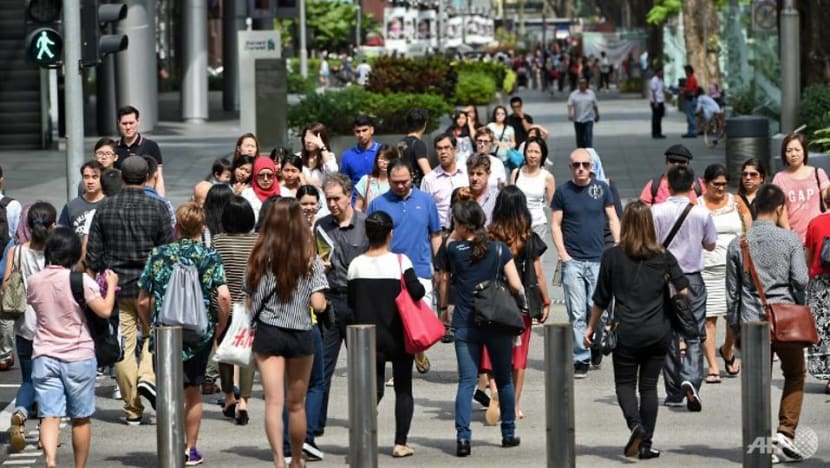Commentary: Why Singapore’s Total Defence Day remains relevant more than 40 years on
From costs of living to artificial intelligence, everyday issues are connected with national security, says Ong Weichong of S Rajaratnam School of International Studies.


This audio is generated by an AI tool.
SINGAPORE: Singapore marks its 41st Total Defence Day on Feb 15, 2025. The concept of Total Defence has crossed the forty-year threshold into what I call the middle-age “uncle” zone.
The forty-year mark is a milestone that warrants reflection in the life of a person or institution. It is important to contemplate Total Defence when norms in global affairs are eroding, and the pace of disruptive change is increasing.
Total Defence, Singapore’s national security strategy, comprises six pillars: Military, civil, economic, social, psychological and digital defence. The challenge for Total Defence in its middle-age years lies not in the soundness of its ideas, but rather in capturing the attention of Singaporeans who may not connect Total Defence with their everyday lives.
In a January survey of Singaporean voter sentiments conducted by Blackbox Research, 35 per cent of respondents said the cost of living and inflation were a top concern, while just 8 per cent selected defence and national security.
Indeed, the connection between everyday issues with national security – such as supply chain disruptions stemming from regional and global tensions – is not always intuitive.
AI-ENABLED THREATS
Artificial intelligence (AI) is another example of an everyday issue that impinges on defence matters.
On Jan 27, Chinese startup DeepSeek shocked Wall Street with its latest AI model, which it said is more cost-efficient than those developed by American firms like OpenAI and Google. The intensifying competition in the AI space will change the way we work, live and fight.
Since the start of the Gaza War in October 2023, evidence has emerged that AI systems such as “Gospel”, “Lavender” and “Where’s Daddy?” have been used by the Israeli Defence Forces to identify, track and target suspected Hamas militants and infrastructure. These tasks were once carried out by human soldiers.
Despite concerns raised by human rights organisations on the accuracy and reliability of such systems, it is unrealistic to expect militaries to abandon the development of AI weapon systems. Battlefields from the Middle East to Ukraine will continue to serve as the “classroom” of AI-enabled warfare.
AI-enabled warfare spans drone attacks capable of destroying mass armoured formations to cyber weapons that can learn, adapt and evolve based on data collected from both military and civilian targets.
While a strong and capable Singapore Armed Forces (SAF) continues to serve as a deterrent against conventional war, there is an urgent need to strengthen Singapore’s defences against the growing threat of AI-enabled cyberattacks that can cripple critical infrastructure, disrupt essential services and undermine public trust.
In this post-truth era, messages that appeal to emotion hold more sway than fact-based ones. As AI tools evolve, disinformation campaigns that undermine social cohesion will become more sophisticated.
Singapore has done well in maintaining social cohesion and trust in public institutions, which are key to national resilience. It should continue to raise media literacy among the public and foster a sense of community through grassroots organisations.
BOTH HARDWARE AND HEARTWARE MATTER
Singapore has returned to normalcy after the COVID-19 pandemic, which was described by then Prime Minister Lee Hsien Loong as “the crisis of a generation”. Is Singapore prepared for the next crisis?
The country has the “hardware” in the form of sound policies, strong institutions, and back-up plans to cope with disruption. Renewing the “heartware” in the form of sustaining public support and personal connection with Total Defence is the more demanding task.
Initiatives such as YouthxHack 2024 and Critical Infrastructure Defence Exercise 2024 have helped cultivate leaders in cybersecurity by posing real-world challenges to participants. They are positive signs that Total Defence can remain relevant in its middle age years and beyond.
Cyberweapons such as deepfakes and disinformation can be countered by technological means. Over-reliance on technological tools, however, can exacerbate existing inequalities between those with access to technology and those who do not.
These include Singaporeans who lack the means to cope with online scams that are growing in number and evolving in severity. The Protection from Scams Bill was passed in January to better protect potential scam victims, but legislation is often playing catch up to AI-enabled threats.
Renewing the Total Defence heartware involves not only businesses and civil society, but also vulnerable individuals who may not make the connection between Total Defence and their everyday lives. AI-driven disruption may seem overwhelming, but by leveraging our social capital and resilience, together we can keep Singapore strong.
Dr Ong Weichong is Head of the National Security Studies Programme at S Rajaratnam School of International Studies (RSIS), Nanyang Technological University (NTU), Singapore.

















